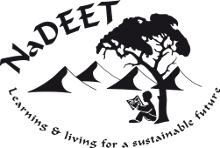NaDEET Centre

We practice what we teach!
NaDEET’s Environmental Education centre facilitates hands-on experiential learning in a desert environment. The key feature of NaDEET Centre is that programme participants not only hear about sustainable living, they actually live it. Located in a dune valley on the NamibRand Nature Reserve, NaDEET Centre was developed with an innovative design and alternative technology. The Centre facilities include one main building and eight accomodation houses. All accomodation houses have access to bucket showers and long-drop toilets. All buildings are made of wood and have shade cloth windows and corrugated iron roofs. The NaDEET Centre experience emphasizes teamwork and the three overarching concepts of energy, water, waste. For a closer look at the NaDEET facilities click here.
 Energy:
Energy:
Namibia is blessed with sunshine virtually all year round, and NaDEET Centre offers practice in utilising this environmentally-friendly alternative energy source. Solar panels generate all of NaDEET's electricity—enough to power lights, a fridge, a freezer and electronic equipment for the classroom. During the day, solar energy charges batteries for electricity at night. Participants conduct an energy audit daily to track usage. Participants prepare all meals using parabolic solar cookers and solar ovens. In the mornings, we use fuel-efficient stoves to boil water. These stoves use less fuel by trapping the heat around the pot or kettle; therefore, cooking is faster than over an open heat source. As fuel, we used recycled firebricks made from wastepaper products. To keep food warm, we use a well-insulated hot box, thus eliminating extra energy needed to reheat food. Solar water heaters provide hot water for washing dishes and bathing. The water heaters work through absorption, the greenhouse effect and proper insulation.

Water:
To reduce water wasting in our water wise washrooms facilities, we have no taps that can be opened and left running. Instead, there is a tank with limited water, which participants can use for the bucket showers, brushing their teeth and washing their face and hands. The Centre has long-drop composting toilets instead of flush toilets. NaDEET Centre provides a water bottle for each participant to reuse throughout the programme. Cleaning the kitchen and dishes is done in small teams to reduce water use, and water is reused for compost. Participants measure the group’s water use on a daily basis using water meters and water tanks. In doing so, they hold themselves accountable for consumption, and they can track improvements in their water saving.

Waste:
NaDEET Centre emphasizes the 5Rs of Waste Management: Reduce, Recycle and Reuse. We choose food products with minimal wrapping and waste materials to reduce the amount of items that are unnecessarily thrown away. The centre itself was constructed with many reused items such as wood, netting, and bathroom fixtures. We also reuse materials on a daily basis, including water bottles, plastic bags, newspapers and food containers. NaDEET Centre sorts recyclable materials and takes plastic, tin and glass to a recycling centre in Windhoek. We recycle newspapers, egg cartons and other wastepaper products into recycled firebricks, which we then use in our fuel-efficient stoves. We use plastic bags to make rubbish baskets, and we compost our left-over kitchen scraps into soil. Not to mention crafts like recycled milk carton wallets!






